12 best Jobber alternatives for field service businesses

Running a field service business is no easy feat. Between managing multiple jobs, dispatching crews, handling equipment and materials, making sure invoices are sent on time, and keeping clients happy, your days are full. 🛠️👷🖥️
With field service management software, you can better handle scheduling, invoicing, and customer management in one platform.
Jobber is one of the most popular choices. But as your team grows or you dig deeper into its features, you might find Jobber lacks the flexibility or integrations you need. That’s when it’s time to start looking for other options. For instance, if you want your field service CRM and accounting to sync smoothly, Method CRM for field services is a strong choice with its real-time, two-way QuickBooks integration. 🔗
Here at Method CRM, we’ve been supporting QuickBooks-based businesses since 2010. Method is loved by field service businesses for its instant QuickBooks sync, end-to-end sales automation, and customization services. In this guide, we look into the best Jobber alternatives that work the way your service business does. 💯🚀🎯
Why look for a Jobber alternative? 🤔
Even popular platforms can fall short when your team grows or your business needs change.
Here’s why some users outgrow or abandon Jobber:
- Steep pricing structure: Jobber starts at $29/month/user (billed annually), which is ideal for very small teams that require the essentials. Costs quickly climb once you add more features, with the “Connect” plan at $89/month/user, and the “Grow” plan at $149/month/user.
- Limited customization: Jobber provides basic customization options, which may be insufficient for your unique workflows. Options to create custom fields are limited, custom job forms can’t accommodate complex industry-specific requirements, and there’s little flexibility in tailoring reports.
- Less advanced automation and CRM functionality: While Jobber features core CRM features, it lacks advanced functionalities like complex nurture campaigns, sales funnel tracking, and predictive analytics. This limitation won’t be suitable for businesses seeking deeper automation capabilities.
- Basic dispatching and scheduling: Users may find Jobber’s dispatching and scheduling tools to be more basic than some of its competitors. You can’t set priority-based job assignments or automated dispatching rules, routing and tracking features can feel limiting (no real-time traffic adjustments or dynamic rerouting), and the drag-and-drop calendar is easy to use, but may fall short for those with multiple teams, varying job durations, or overlapping service areas.
- Integration gaps with QuickBooks or other tools: Jobber integrates with QuickBooks Online, but not with QuickBooks Desktop. Further, its native CRM is not very robust, so connecting with other CRMs and tools is often necessary. This can add extra steps and slows down your workflow.
- Support and onboarding challenges: Jobber provides basic support on its Core, Connect, and Grow plans. Customer support hours are limited to weekdays.
How to choose the right field service software for your business 💡
Here’s what to consider when selecting software that fits your unique business needs.
Match features to trade needs ⚙️
Field service businesses aren’t all the same, and your software should reflect that. The last thing you’d want is a massive toolkit that’s confusing to navigate, with half the tools just gathering dust.
For home service businesses, for example, here are some of the features various trades will need:
- HVAC teams: Real-time dispatching for emergency calls, preventive maintenance scheduling, equipment and warranty tracking, and customer service history to efficiently handle recurring service requests.
- Landscapers: Route-optimized job scheduling, seasonal service reminders, client approvals for design plans, invoicing for recurring contracts, and photo documentation to showcase work progress.
- Contractors: Detailed job costing for materials and labour, project timelines with milestone tracking, compliance and permit management, subcontractor coordination, and centralized document storage for blueprints, contracts, and change orders.
Every trade has unique pain points, so software that applies to one might not be a fit for another. That’s why it’s important to focus on the features that solve your specific challenges.
Consider your team size and growth trajectory 👥👥
Your team’s size can affect which field service software to use. Solo operators may only need basic tools to streamline scheduling and invoicing. Shops with 10+ employees need robust dispatching, job tracking, and team collaboration tools to optimize team productivity. Multi-location businesses require centralized management and scalability across all their sites.
Also, consider the longevity of your software beyond its current size. Your software should grow with your business and allow additional users, locations, or service lines without forcing a costly switch down the line.
Prioritize integrations 🔀
The level of integration a software supports influences the efficiency of your operations.
Here are some key integrations to note:
- QuickBooks/Xero: Keep accounting and invoicing synced without double entry.
- Payment tools: Accept payments quickly and securely.
- Email platforms: Send updates, notifications, and reminders without switching tools.
- CRM systems: Track leads and manage customer interactions without the extra work.
- Mobile apps: Give field teams access to schedules, updates, and client info on the go.
Evaluate pricing transparency and support 💰
Sometimes, the initial price you see for field service software does not tell the full story. Surprise costs and support limitations can turn a promising platform into a frustrating experience.
Watch out for these hidden costs:
- Per-user fees: Costs can jump significantly as you add team members.
- Add-ons: Extra features may come with unexpected charges.
- Setup charges: Some platforms charge for initial configuration.
- Support availability: Check if help is offered in your package.
- Onboarding assistance: Ensure training is included, especially for larger teams.
- Ongoing support: Make sure support is still available after launch to prevent/mitigate downtime.
Running a field service business involves a lot of tasks, and whether you’re a small business that’s looking into reducing the manual work or a multi-location operation managing dozens of teams, the right field service software can make all of that manageable.
The 12 best Jobber alternatives on the market 🥇
Jobber has long been a go-to software solution for service providers because it lets you manage many of those tasks in one platform. However, there are other options out there that may be more tailored to your unique needs.
Whether you’re in lawn care, pest control, plumbing, or running a crew of electricians, there are tools built to handle your specific workflows.
We’ve rounded up the leading Jobber alternatives.
Note: All prices are billed annually and are in USD.
1. Method CRM for field services: Best for QuickBooks-integrated CRM and customizable workflows
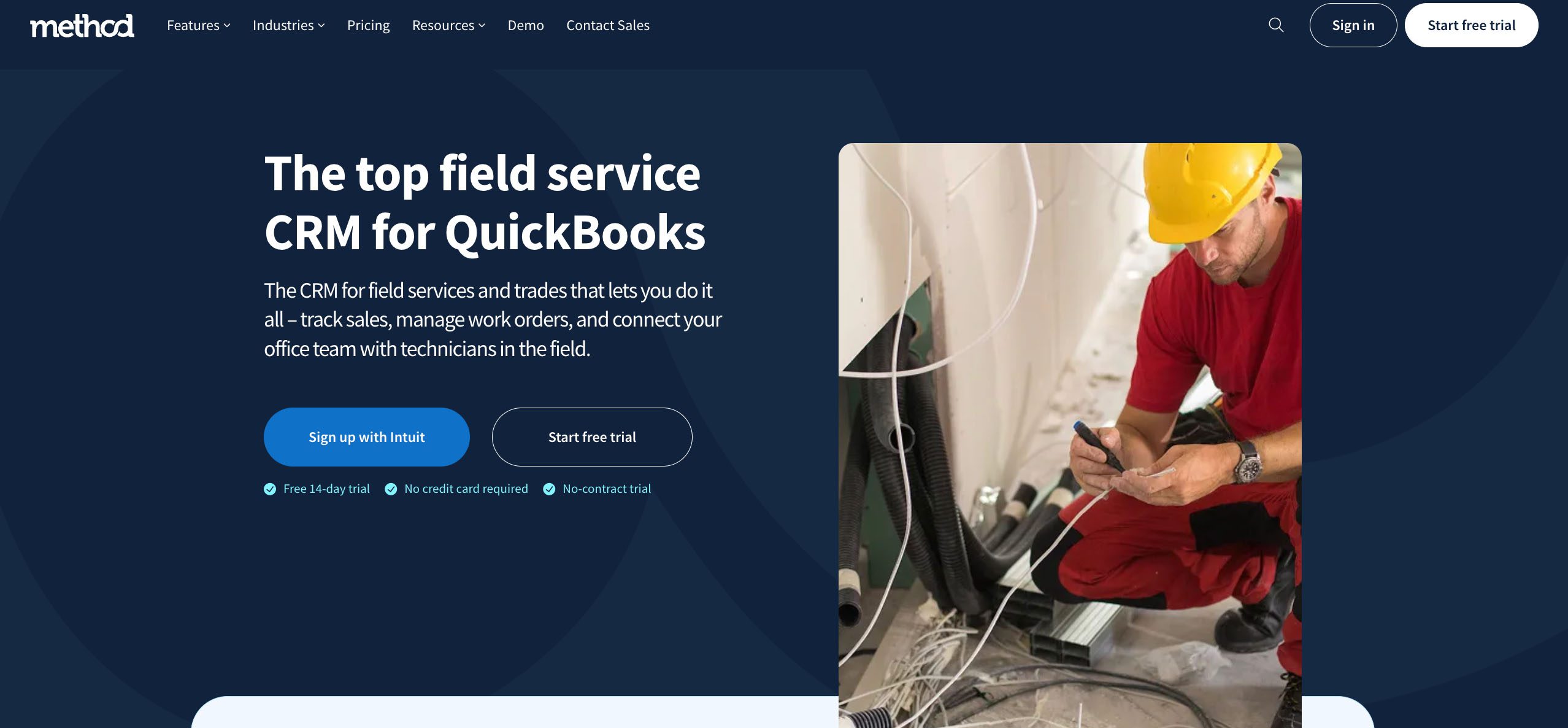
Method CRM for field services is a cloud-based CRM built for businesses that rely on QuickBooks (Online and Desktop) and Xero. Its biggest edge is a two-way, instant sync with your accounting software, which keeps your invoices, customer communication, and payment records always up to date.
Method also integrates smoothly with everyday tools, like Gmail and Outlook for email, Mailchimp for marketing, Jotform for forms, and Zapier to connect with hundreds of other apps. Paired with its automation capabilities and dedicated onboarding support, Method is for those who want full control over their CRM while staying closely linked to their accounting software.
For field service companies specifically, Method offers scheduling, dispatching, mobile work orders, and route management features, making it a good choice if you need a customizable CRM and tools to manage day-to-day field operations in one system.
Features:
- Best-in-class two-way sync with QuickBooks/Xero for invoices, payments, and client information.
- Online customer portals for payments and updates.
- Workflow automation for sales, service, and accounting tasks.
- Mobile app for on-the-go access to work orders and client information.
- Scheduling, dispatch, and routing tools.
Pricing:
Free 14-day trial (includes an hour setup demo and an hour of customization)
- Field Crew Technician: $15/user/month
- Dispatcher: $45/user/month
2. Housecall Pro: Best all-in-one alternative for growing field teams
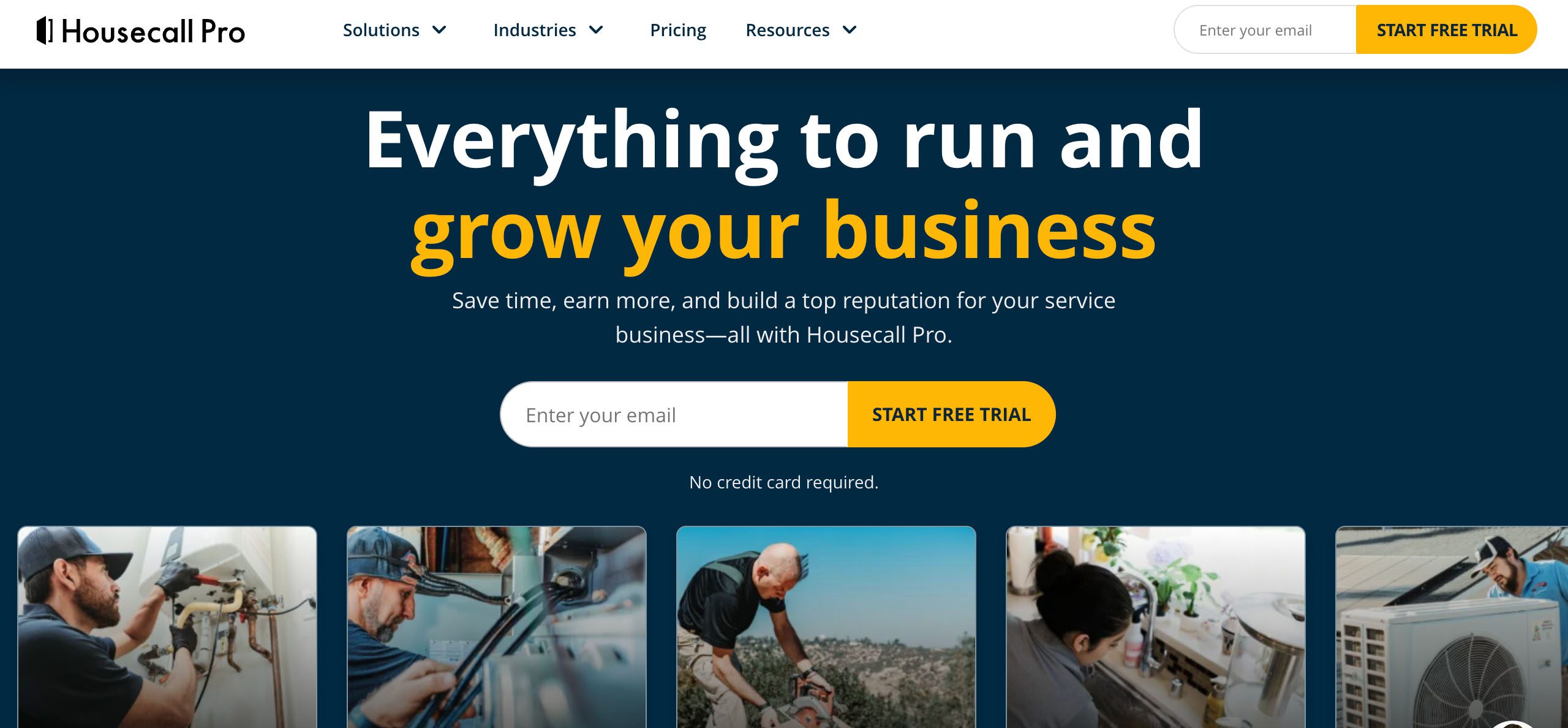
If you’re a growing home service team (plumbers, electricians, pest control, HVAC, cleaning, and landscaping), Housecall Pro is the field service management software for you.
With online booking, dispatching, job tracking, payment processing, and customer communication in one place, service business owners get a unified system that handles both the field and office sides of their operations.
Features:
- Drag-and-drop scheduling, real-time dispatching, and GPS for field teams.
- Estimates, invoicing, and paperless payment processing (including credit cards) in the field.
- Job tracking and reporting dashboards covering profitability, employee performance, and revenue per job.
Pricing:
- Free trial available; Basic at $59/user/month; Essentials at $149/month (up to five users); Max at $299/month (up to eight users).
Not completely sold on Housecall Pro? Check out the best Housecall Pro alternatives and competitors.
3. FieldPulse: Best mobile-first app for small service teams
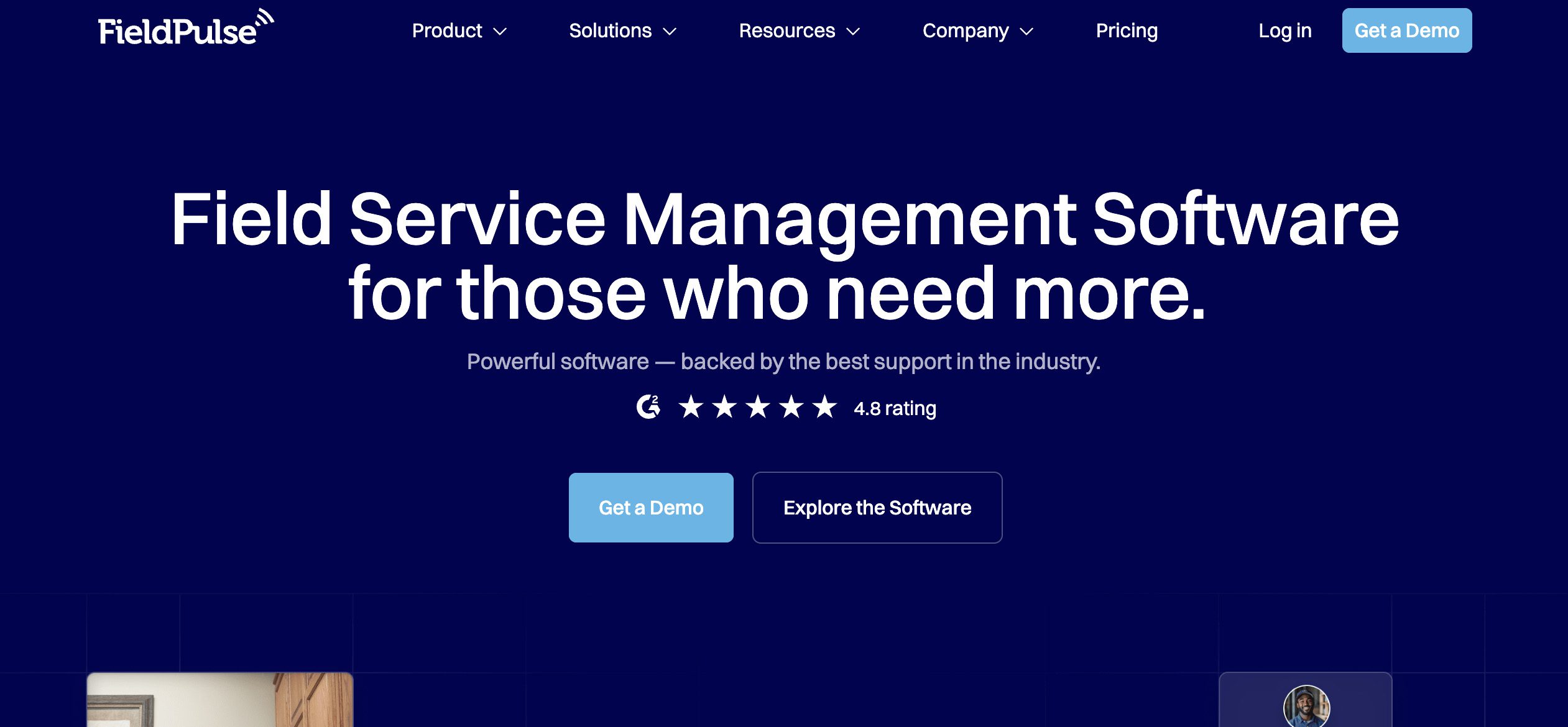
FieldPulse is a reliable field service management app for small and growing service teams because it’s lightweight, mobile-first, and made for handling everyday fieldwork without the complications.
Unlike heavier platforms that require long onboarding, this platform gives service professionals nearly full functionality, including the ability to schedule jobs, send invoices, and manage customer communication, right from their mobile device.
Features:
- Mobile app (iOS and Android) for full access to projects and data in the field.
- Custom forms (with photos and conditional logic) to track inspections, safety checks, and service history.
- Customer management and integrated communication tools for reminders, status updates, and message history.
Pricing:
- All plans (Essentials, Professional, and Enterprise) are quote-based.
4. ServiceTitan: Best for larger enterprises with higher budgets
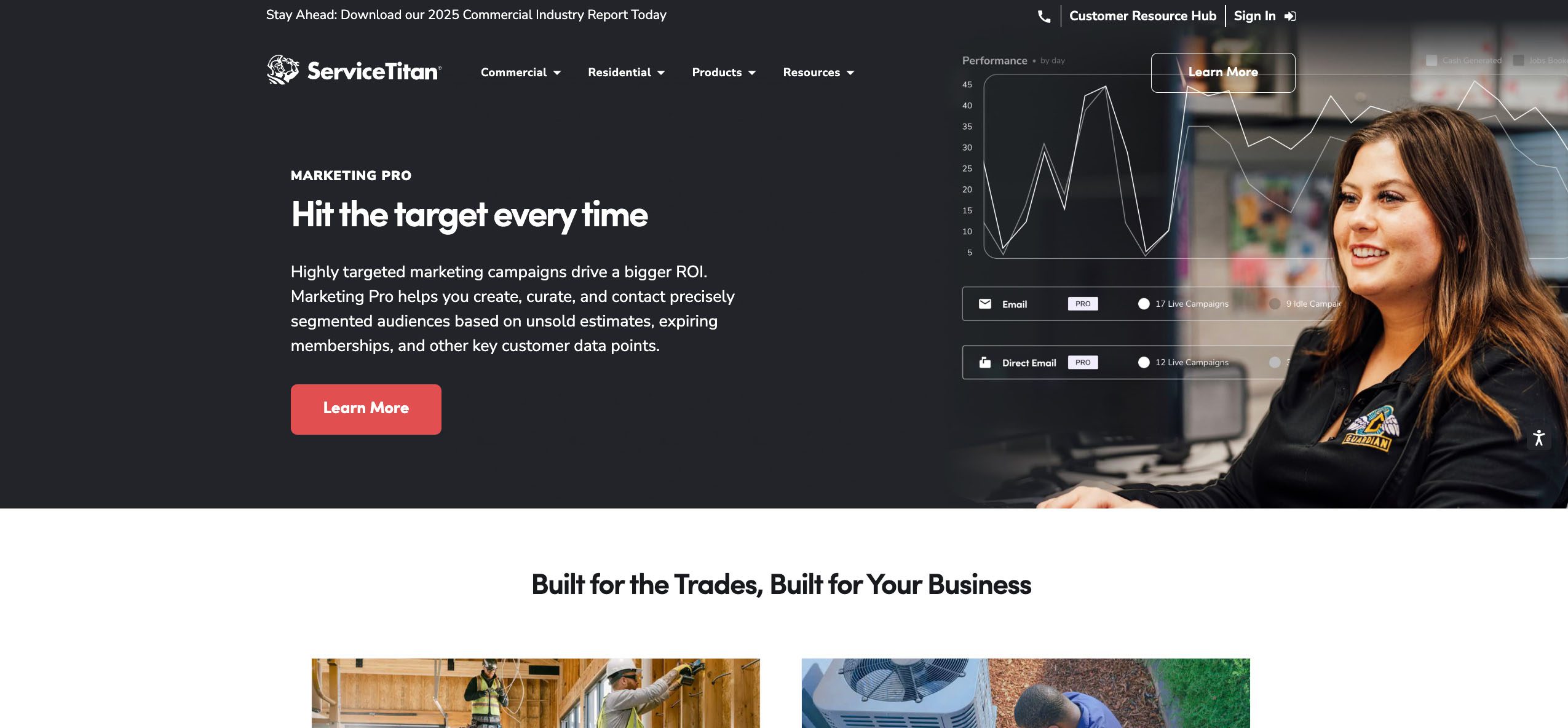
ServiceTitan is a comprehensive field service management solution for multi-branch trade companies with large teams, high job volume, and complex workflows.
It’s ideal for enterprises that can afford a bigger software investment, want deeply integrated features, and need tools that support growth, efficiency, and oversight on a larger scale. That said, its steep learning curve and higher price point may deter smaller businesses.
Features:
- Manage stock across trucks and warehouses, and track equipment history.
- Advanced reporting tools, dashboards, and KPI tracking (profit margins, conversion rate, tech performance) to support data-driven decisions.
- Customer experience tools, like customer portals, self-scheduling and payments, two-way SMS, and technician ETA notifications.
Pricing:
- Free demo available; custom quotes for tiered plans (Starter, Essentials, The Works).
We compare ServiceTitan vs Housecall Pro vs Method here.
5. Service Fusion: Best for centralized job and customer management
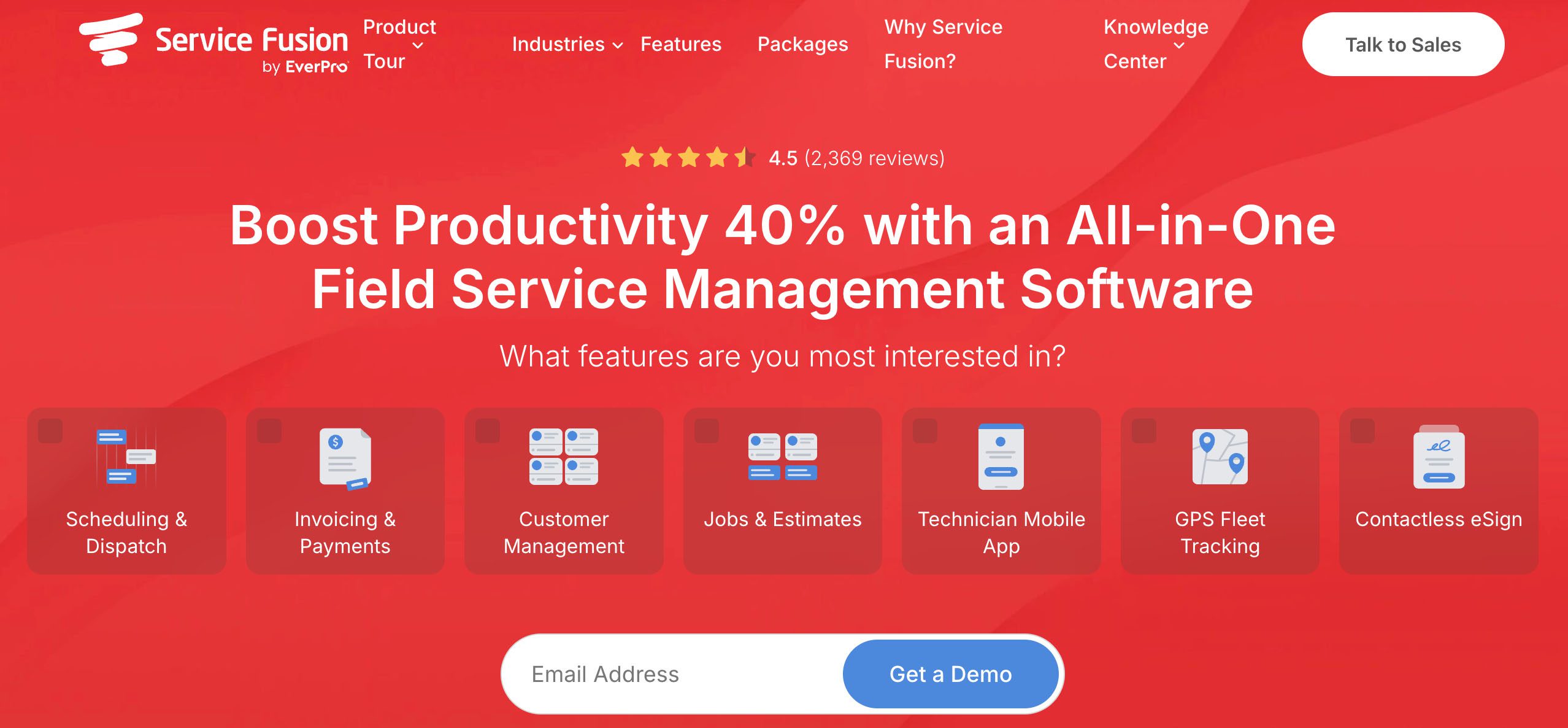
As a cloud-based field service management platform, Service Fusion centralizes jobs, work orders, customer data, scheduling, dispatch, invoicing, and communication for field and office teams to stay aligned.
If you’ve been juggling separate systems or losing track of service history, ServiceFusion helps tighten up job management and customer communication in one place. Another big plus? Every plan includes unlimited users, which means growing teams can add people without increasing the cost.
Features:
- Centralized customer database with service history, job notes, documents, and reminders via email/SMS.
- Drag-and-drop scheduling and dispatching with real-time updates and a mobile app for technicians.
- Integrated invoicing and payment processing in the field, plus QuickBooks sync.
Pricing:
- Free demo available; book a demo for a quote.
Learn about the best Service Fusion alternatives here.
6. Workiz: Best for on-demand service businesses
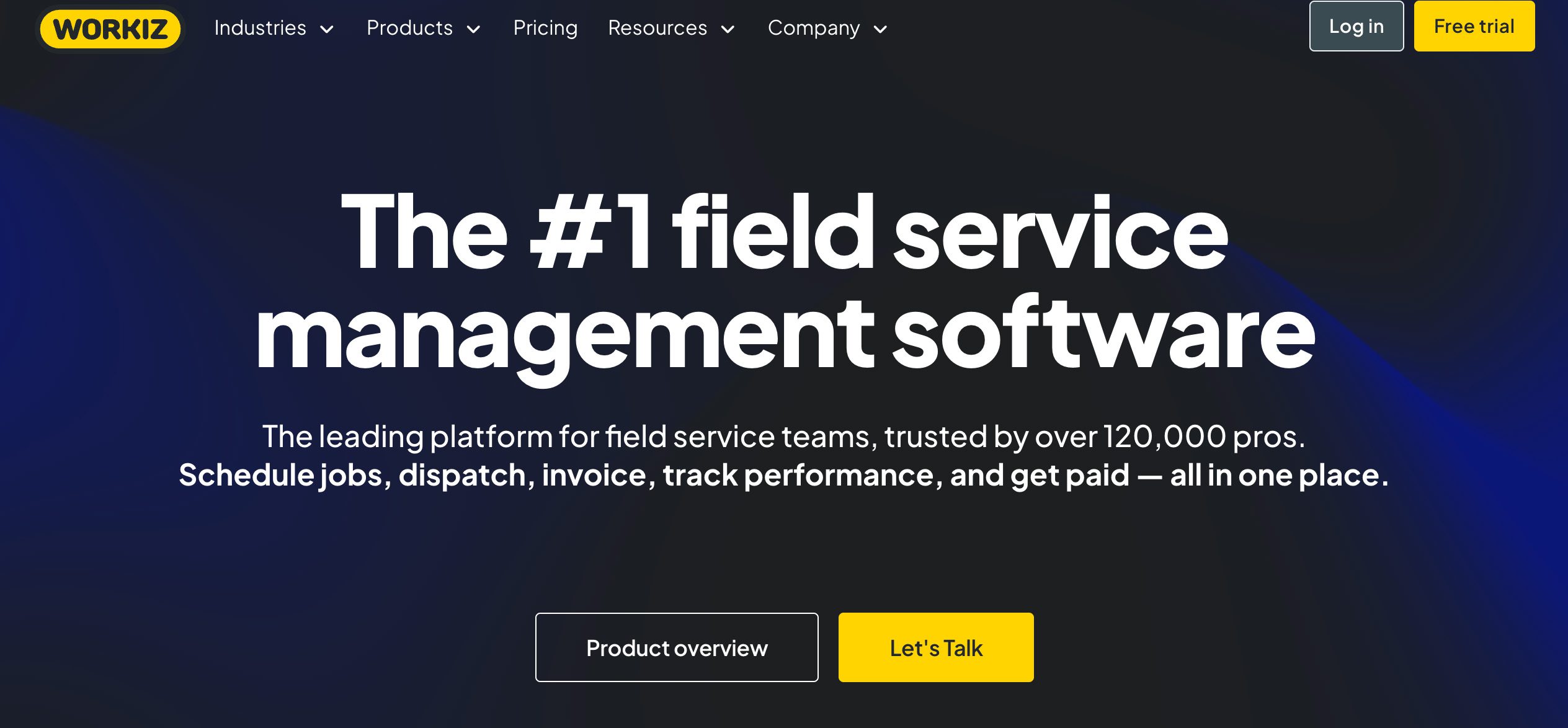
Locksmiths, appliance repair crews, and junk removal teams usually run on last-minute calls. Need a tool for trades where every inquiry requires a quick response? Workiz may be a good fit.
Workiz stands out for its focus on a fast job flow, built-in phone system, and a mobile app designed so field techs can pick up, execute, and close jobs with minimal back-and-forth.
Features:
- Set up service plans, recurring jobs, and agreements to drive repeat revenue.
- Price book tool for consistent estimates, quick quotes, and transparent job pricing.
- Voice and text automation and a built-in phone system for tracking calls and messages with clients.
Pricing:
- Free trial available; unlimited free plan is available (Lite) for up to two users; Kickstart at $187/month for up to three users; Standard at $229/month for up to five users; Pro at $270/year for up to five users; and Ultimate for custom pricing.
See how Workiz vs Jobber vs Method stack up.
7. Kickserv: Best starter plan
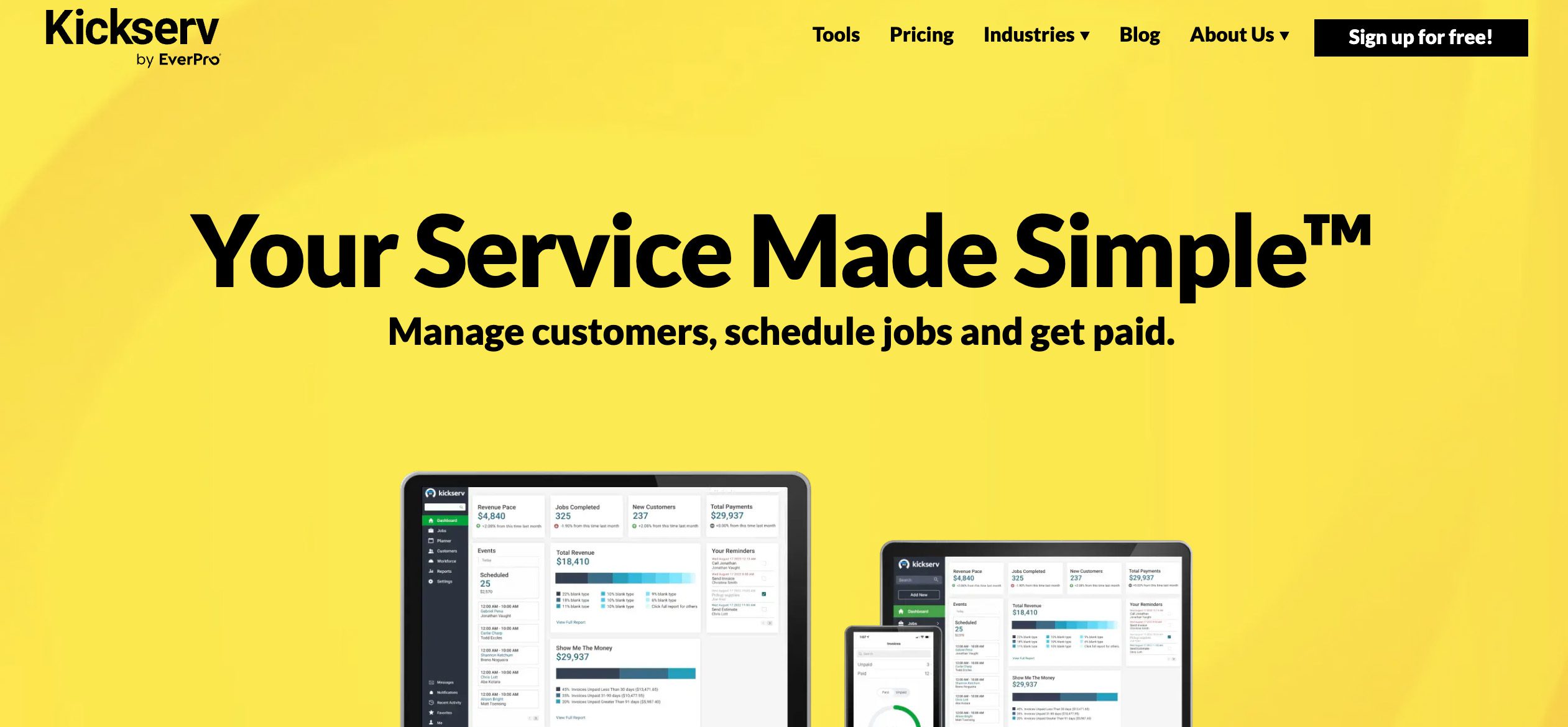
Kickserv is aimed at small to medium-sized service teams that are familiarizing themselves with field service management software.
What makes Kickserv stand out is its “Flex” plan, which gives you core tools at a relatively low flat cost so you can start managing jobs without breaking the bank. This plan is ideal for businesses that want to grow but don’t yet need all the bells and whistles of enterprise-level software.
Features:
- Estimates, jobs, and invoices, plus a contact manager in the starter plan.
- Integrates with QuickBooks Online and Desktop.
- Custom tagging, filters, search, and custom data fields to keep your pipeline organized
Pricing:
- Free trial available; Flex at $19/month for up to three users; Lite at $49/month for up to five users; Standard at $100/month for up to 10 users; Business at $167/month for up to 20 users; Premium at $250/month for unlimited users.
See what the best Kickserv alternatives are.
8. JobNimbus: Best for roofing and exterior contractors
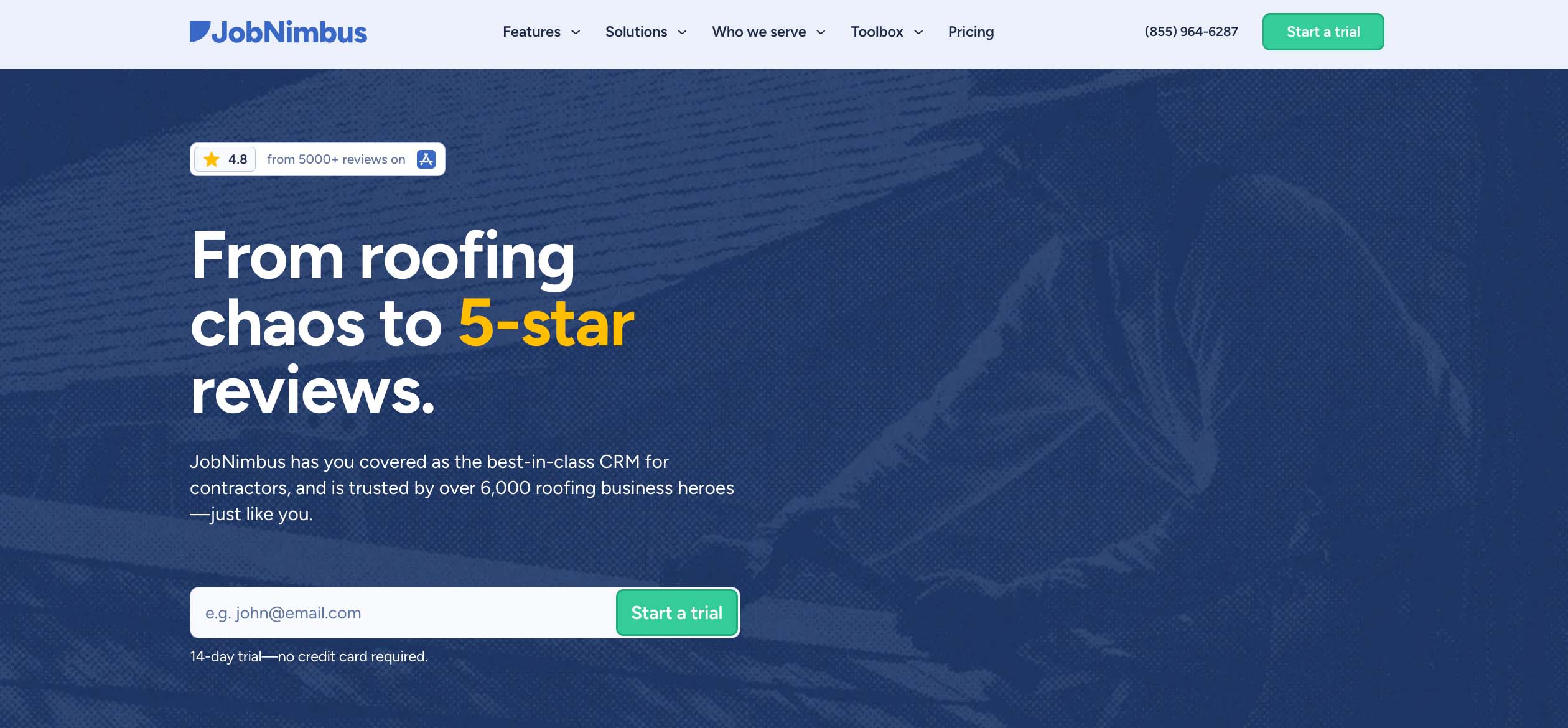
Roofing is messy, fast-moving, and often involves subcontractors, suppliers, and dozens of jobsite photos for a single project. JobNimbus is made to handle that chaos.
JobNimbus combines CRM and project management in one platform. Unlike generic field service software, JobNimbus leans heavily into the needs of exterior trades, from aerial measurements to supplier ordering. It’s a strong fit if your business handles high-value projects, multiple crews, and a heavy flow of leads.
Features:
- Visual job boards and custom workflows that move leads through sales, estimating, production, and collections.
- Industry-specific integrations (QuickBooks, CompanyCam, EagleView) that cut down on manual admin.
- Aerial measurement integrations and direct supplier ordering (like Beacon) to speed up material planning.
Pricing:
- Free trial available; paid plans (Growing, Established) require a request for a quote.
Aside from JobNimbus, discover the other best CRM systems for construction in 2026.
9. mHelpDesk: Best for end-to-end job lifecycle
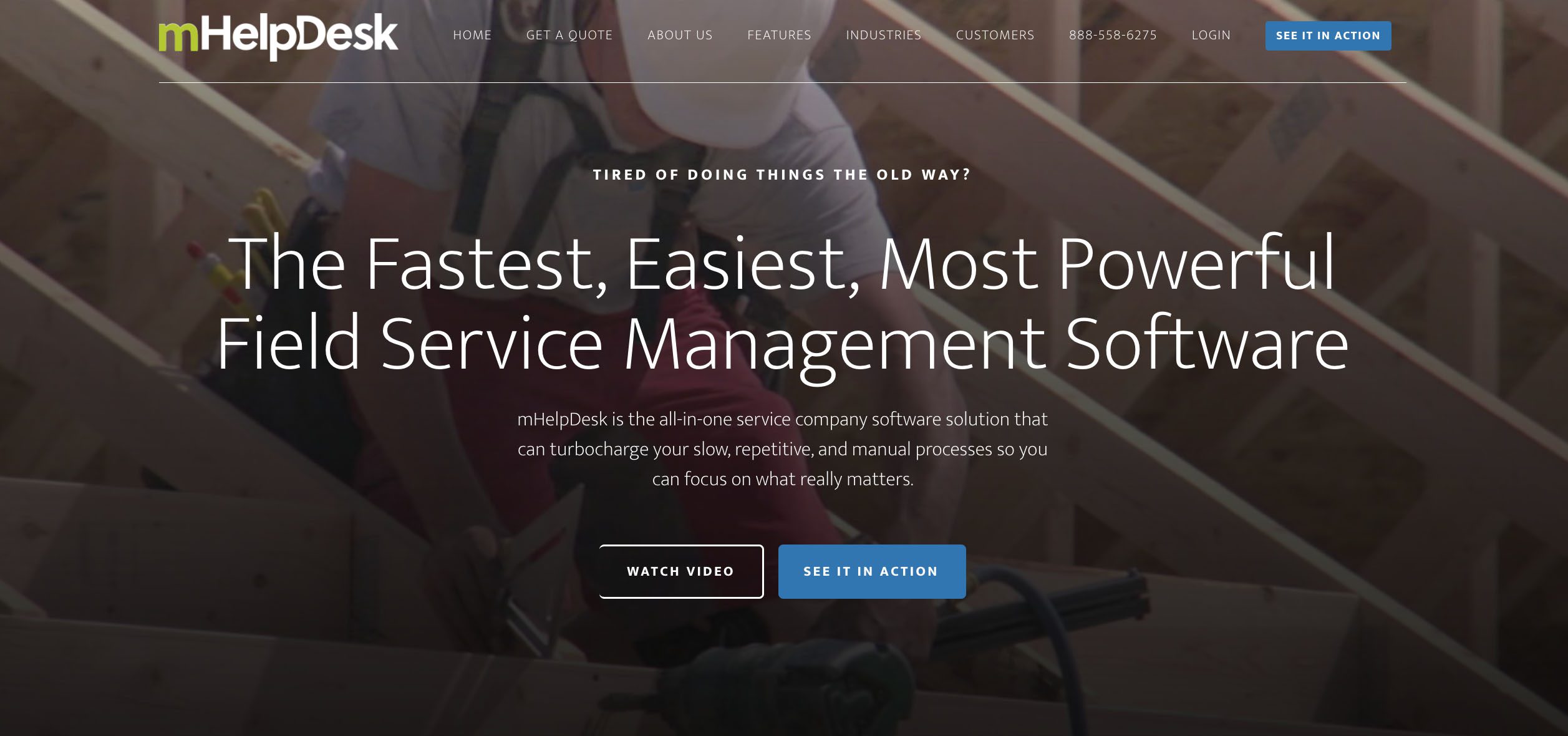
mHelpDesk is made for businesses that want control over the entire job lifecycle, involving capturing leads, sending estimates, dispatching techs, field management, collecting payment, and keeping customers in the loop.
So if your company deals with frequent jobs, multiple techs, repeat customers, and you want fewer apps and less manual handoff, this tool can handle all that.
Features:
- Lead capture and mobile-friendly estimating that syncs instantly with the office.
- Customizable workflows that mirror your job stages from intake to payment.
- Built-in communication tools with automated SMS/email updates and “on-the-way” alerts.
Pricing:
- Free trial available; request a demo for an official quote.
Read our list of the best HVAC apps on the market.
10. FieldEdge: Best for real-time dispatching
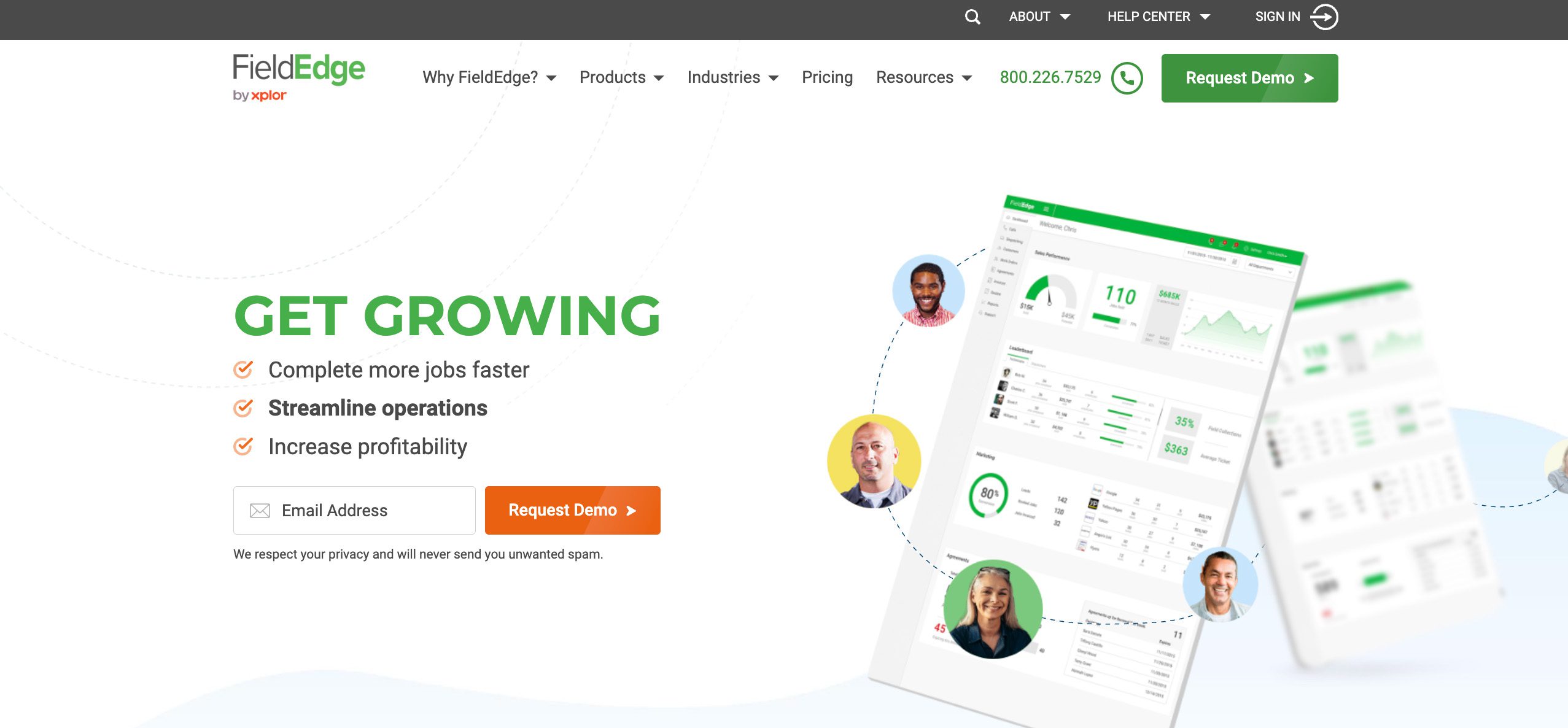
FieldEdge is a field service management platform built for trades, with real-time dispatching being its key strength. It has a dedicated dispatch board that lets you track technician status, reassign jobs instantly, and optimize routes on the fly.
With map-based scheduling and mobile access, technicians and office teams stay fully synchronized. Businesses benefit from fast responses, efficient job coverage, and tight coordination to keep customers happy.
Features:
- Smart dispatching and scheduling with real-time tech status, location mapping, and on-the-fly work order reassignment.
- Mobile app for dispatch and work order management, including view/update jobs, invoices, and customer/equipment history.
- Flat rate pricing tool with a comprehensive parts and repairs database for confident upfront quotes.
Pricing:
- A free demo is available; quote-based pricing.
Read our top five FieldEdge alternatives and competitors.
11. RazorSync: Best mid-range tool for job and crew management

RazorSync balances job and crew management features and affordability. So even at a more cost-efficient price, it still offers powerful features like real-time crew dispatching, route optimization, and mobile work order access.
These features support small to medium-sized teams that need to stay on top of multiple jobs, coordinate crews efficiently, and maintain visibility across customer requests without sacrificing operational control.
Features:
- Real-time GPS tracking to monitor technician locations and job statuses.
- QuickBooks integration for seamless accounting and invoicing.
- Inventory management, templates, and reporting dashboards for profitability insights.
Pricing:
- Free trial available; Solo at $85/month for up to two users; Team at $175/month for up to seven users; Pro at $360/month for up to 15 users; Enterprise plan available for custom pricing (unlimited users).
12. Simpro: Best for large jobs and inventory management
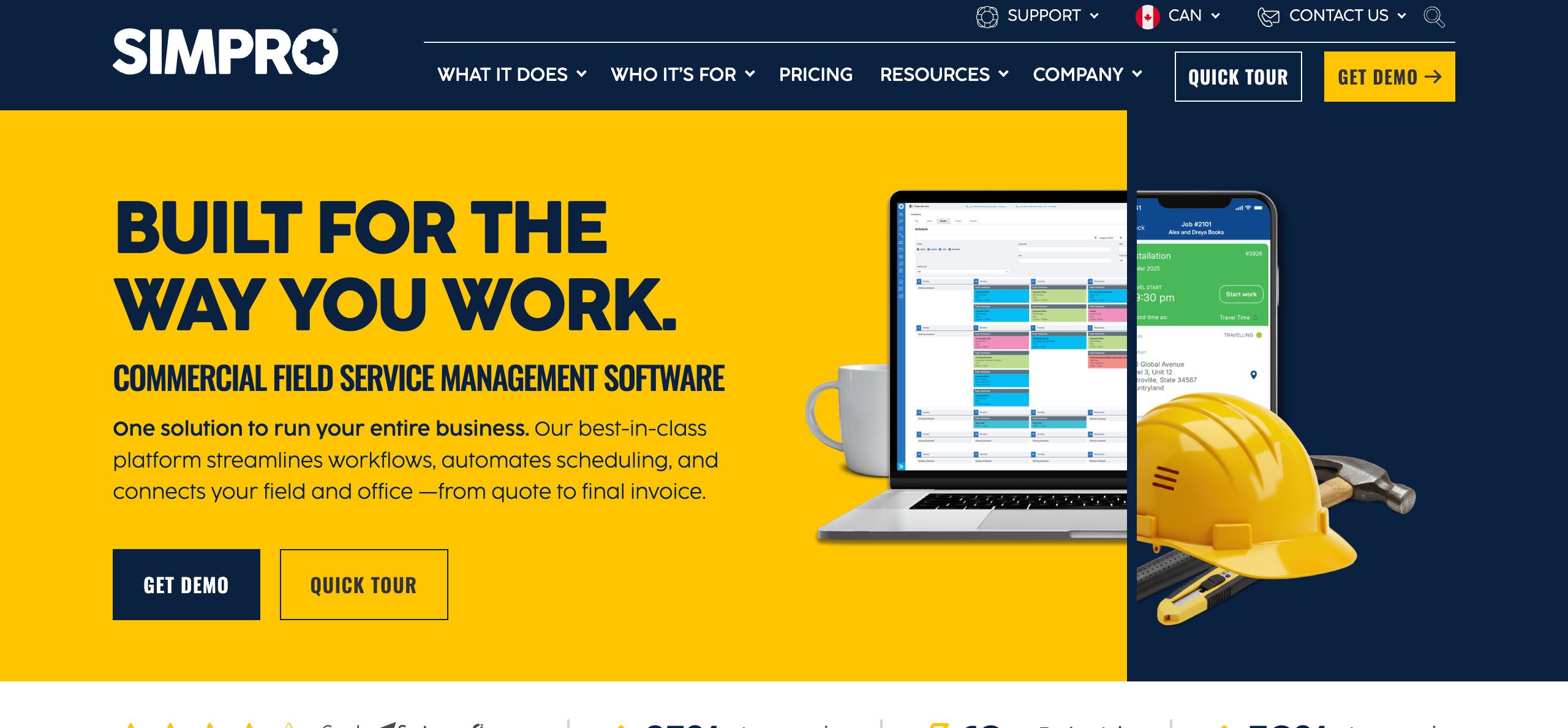
Need a platform that can handle massive jobs without missing a beat? Simpro has you covered. It excels in managing substantial jobs and intricate inventory systems, making it a top choice for industries such as electrical, HVAC, plumbing, fire protection, and security services.
Designed for enterprise-level needs, features like robust quoting capabilities, detailed job costing, and advanced inventory management let businesses handle large-scale projects much more easily and with precision.
Features:
- Real-time inventory management to manage stock levels, track materials across multiple locations, and automate reordering processes.
- Comprehensive job costing that lets you track all the expenses associated with a job, including labour, materials, and subcontractors.
- Oversee large projects with project management features like scheduling, task assignment, and progress tracking.
Pricing:
- Only a free demo is available; requires a demo for a quote.
Jobber alternatives: Quick comparison table ⚖️
When evaluating field service management software, it’s important to consider your business’s specific needs, size, and industry. Jobber is popular, but these alternatives offer features that might better suit your team.
Here’s a comparison table that puts the top Jobber alternatives side by side.
| Software | Best for | Key features |
| Method CRM for field services | QuickBooks-integrated CRM and custom workflows | Real-time, two-way sync with QuickBooks/Xero, online customer portal, workflow automation, mobile app, scheduling/dispatch. |
| Housecall Pro | All-in-one for growing field teams | Drag-and-drop scheduling, real-time dispatch and GPS, estimates/invoicing/payment in the field, and job tracking and reporting dashboards. |
| FieldPulse | Mobile-first for small service teams | Custom forms with photos and conditional logic, and customer management and communication. |
| ServiceTitan | Large enterprises with bigger budgets | Stock and equipment tracking, advanced reporting, customer portals, and self-scheduling and payments. |
| Service Fusion | Centralized job and customer management | Centralized database, drag-and-drop scheduling and dispatch, integrated invoicing, and QuickBooks sync. |
| Workiz | On-demand service businesses | Recurring jobs/service plans, price book tool, and built-in phone system with voice/text automation. |
| Kickserv | Starter plan for small teams | Estimates, jobs, invoices, contact manager, QuickBooks integration, and custom tagging and fields. |
| JobNimbus | Roofing and exterior contractors | Visual job boards, custom workflows, industry integrations, aerial measurement, and supplier ordering. |
| mHelpDesk | End-to-end job lifecycle | Lead capture and mobile estimating, custom workflows, automated SMS/email updates, and on-the-way alerts. |
| FieldEdge | Real-time dispatching | Smart dispatch board with tech status/location, mobile app for work orders, and a flat-rate pricing tool. |
| RazorSync | Mid-range job and crew management | Real-time GPS tracking, route optimization, mobile work order access, QuickBooks integration, and inventory and reporting. |
| Simpro | Large jobs and inventory management | Real-time inventory management, detailed job costing, project management, scheduling and progress tracking. |
Why Method CRM is a top Jobber alternative 🏆
Method CRM for field services is the preferred choice for service businesses that need flexibility, accounting integration, and field service tools all in one platform. Unlike Jobber, it combines deep customization with automation and support, so teams get full control over their operations using one software.
These are the main reasons why you should switch to Method CRM:
- Built for businesses that grow and change: Method lets you customize workflows, automate repetitive tasks, and adapt processes, so your software grows with your business.
- CRM + field service + accounting in one place: With Method, your customer data, job tracking, invoices, and payments live together. Field techs, office staff, and accountants all stay in sync without juggling multiple systems.
- Especially powerful when scaling from Excel or QuickBooks-only workflows: If you’re currently managing contacts, jobs, or invoices manually or only in QuickBooks, Method makes it easy to automate and centralize your processes while keeping your accounting accurate.
Time to upgrade: Choose the right Jobber alternative 🙌
It’s time to explore Jobber alternatives if you feel the platform’s already hitting its limits, like:
- You’re scaling fast and need software that keeps up with new clients, teams, and job complexity.
- You need a deeper CRM or automation to track customer interactions, follow-ups, and streamline repetitive tasks.
- You want pricing that works for growing teams without surprises or steep per-user costs.
You deserve service business management software that matches your growing needs.
Give Method a go and optimize your field service operations. Start your free trial today.



